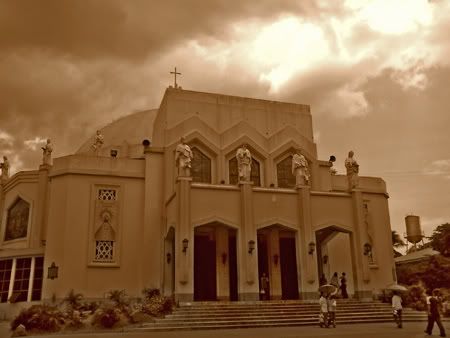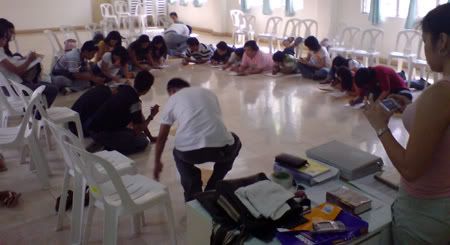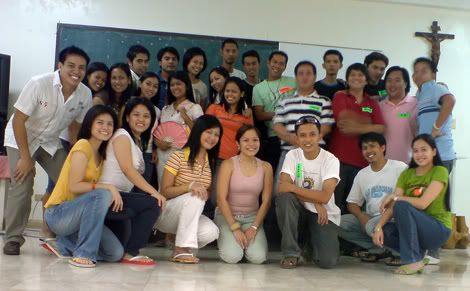I enjoy facilitating reflection sessions, and my years as a clinical supervisor of CBR led me to develop and use materials that have grown from the mere "think about the reflection question per week" done before. Not only are these more interactive, but as far as I know, made the reflection sessions more interesting than usual. So far, we have the "People Puzzle: Personality Style Survey," which aims to describe each person's personality styles and how knowledge of these could lead to better self-understanding and relationships with others. We also have a personal invention of mine, "Free Association Game" (sorry for the lack of creativity in the name), which provides insight on how well you know yourself and others, and how skilled you are in identifying the "good things" in life. There's also "The Path" by Laurie Beth Jones, which I streamlined for 1-2 sessions, which aims to enable a participant to identify his/her "mission statement" at the end.

A few Sundays ago, I was invited in Antipolo City to give a brief seminar to the Kapitanes and Kapitanas. Each year 2 Kapitanes and 2 Kapitanas are chosen to lead the Holy Week Celebrations in Antipolo, and along with their friends organize activities for the whole city. This time, they organized a retreat for themselves, and together with their priests became part of the resource pool.
It's funny, how I feel unworthy to be actually part of such a "sacred" retreat. Sino ba ako para magsalita, eh pati ako, ang dami dami kong issues! Hindi ako banal! Hehe, "banal" (beyn-l) pa siguro... But I took it as a personal challenge, making sure the participants understand that I am among them and with them in this spiritual journey. After hearing that this activity will be followed with a confession, I wanted it to be somewhat preparatory, to guide myself and themselves through a process of self-assessment and eventually gain the appropriate attitude prior to confession.
As an introduction, I gave the group a preliminary exercise where each of the participants would have to draw their ideal selves. I told them that each one of us, ever since we were little kids, was raised to have a set of aspirations that we would like to achieve. Each of us was endowed with a set of capabilities and abilities and a physical body and prowess which more or less we use in order to achieve these aspirations. Of course, some of us may perceive these endowments to be blessings, even to the point of making them the main highlight or tool of our trades. Some of us may even consider them as boons or obstacles towards the achievement of our ambitions. But more often than not, we also consider them as insufficient and often becomes the cause of our insecurities. They proceeded with the activity and soon afterwards, they were sharing each other's aspirations. It was very clear that many of them wanted to change things in themselves. Often times we try to aspire for something that we are not. There is nothing wrong in having ambitions, but the main root of problem here is when these aspirations become a mask in which we hide ourselves. We become slaves to it, rather than we, the masters of our fate. In turn, our perception of what beauty and other things are. Ultimately, our conception of goodness is corrupted, often defining it according to what we want it to be.

Using this as a springboard to the main point of the seminar, I proceeded by sharing insights from Scott Hahn's "Lord, Have Mercy" where he tries to explain how he as a sinner have been constantly concealing and masking played a major, if not pivotal role in his sinful life… I followed with a personal sharing. At first, we often feel a tinge of success and victory over the sins we have done. How lucky we feel in “getting away” with our wrongdoings. In other words, nakalusot o nakaisa tayo. We may be very glad at first, but looking at what we have done at the end of the day, we feel a deep sadness. We may be glad, but there’s a deep emptiness in our hearts. Instead of trying to take responsibility of what has happened we often portray ourselves as the hero or heroine or the hapless victim in this part of the drama of our lives. I proceeded with quotations from Josef Piper's works:
- “Falsification of memory is among our greatest enemy for it strikes the deepest root of our spiritual and moral lives.”
- “There is no more insidious way for error to establish itself than by this falsification of the memory through slight retouches, displacements, discolorations, omissions, shifts of accent”
- “The peril is the greater for its being so imperceptible… Nor can such falsification be quickly detected by the probing conscience, even when it applies itself to this task. The honesty of memory can be ensured only by rectitude of the whole human being.”
As soon as I emphasized these points, I shared how often we complain that we wouldn't have been so neglectful of our spiritual lives if God has been more present in our lives. In the same way when we say that if our parents have been there all the time during our childhood, perhaps, we wouldn't have been that delinquent. God just is so invisible in our lives and can be understandable in the way he was represented in the Bible, especially as the burning bush, lightning, booming voices in the Old Testament. Perhaps, if He would have shown himself more tangibly, we would have been more convinced, isn't it? But indeed, God is there all the time. Not as a judge or magistrate, ready to punish us whenever he can, but he judges as a father does, with love. Life is a stage, in which we as performers try to act the best way we can be… where the only most important spectator is God himself. As a performer on stage, we do not see the audience and seek assurance regarding our performace, because the spotlight is on us. We just do our best, and hope our most important audience approves of it. I proceeded with a discussion on God is simply waiting for us to confess… not forcing us to do so citing various biblical stories, where God, omniscient of everything that man does, still asks the sinning man, "what have you done?", and man goes on denying, hiding, self-pitying and even blaming God for what he had done. God's love is fatherly, as I mentioned earlier. But it is like a double-edged sword, because fathers will always demand more from their children than a judge will demand from the accused.
As a final activity, I asked each one of them to look one more time at the image they drew earlier, and try to see the person that they have built. I proceeded, "Try to remove all the masks that you have built around your face… the many false facades, the lies, the embellishments, the discolorations, make-up, envies, anger, depressions and pretensions… and underneath these numerous layers, guess who you will see? Not your face but the loving face of Jesus… which is what our true reflection should be." We ended up with a prayer, "Lord Jesus, I want to be like you"

After the activity, I tried to answer their questions and realized how as Catholics, we have so many questions and misunderstandings about our faith. This is but healthy and natural to have questions about one's faith, and I told them to be more active in trying to learn more about the faith, rather than diss it for the lack of understanding of it. That's the joy of its mystery. What cracked me up, was that all along during the activity, the participants thought I was a priest. Oo nga naman, pinakilala ako as Rev Cruz! Akala Reverend Cruz! Even the priest thought I was one! But seriously, when I was in high school, I actually thought of entering the seminary. During college, I also came to a point of reconsidering it, even if I had an unfortunate experience with one. Perhaps it's not yet too late. But, as most of my friends will say, kung maging pari ako, napakabastos ko sigurong pari!.




No comments:
Post a Comment